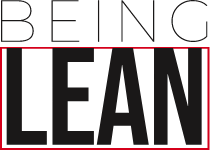How Lean Thinking Can Help Us Overcome the Excuse Barrier
In the realm of personal development, Lean Thinking can be an unexpected but powerful ally. Lean, a methodology traditionally rooted in the manufacturing sector, encompasses a set of tools and principles aimed at improving efficiency and eliminating waste.
But what if we could apply Lean to our personal lives, specifically to tackle the habit of making excuses?
Why making excuses, you ask?
Well, making excuses is often a reflexive response to avoid responsibility or to justify inaction. It’s a hurdle that prevents us from facing challenges head-on and holds us back from achieving our full potential. Just like how Lean identifies and eliminates wasteful processes in manufacturing, identifying and eliminating excuses can streamline our decision-making, improve our productivity, and ultimately lead us to better outcomes in our personal and professional lives.
From analysing our everyday roadblocks to implementing strategies for continuous growth, Lean Thinking offers a structured approach for personal transformation. Here, we'll explore six key elements of Lean and discover how applying these concepts can empower us to break free from the shackles of excuses and embrace a path towards relentless self-improvement.
Below are the six elements of Lean, directly connected with combating excuses:
Value Stream Mapping - Deciphering the Excuse Pathway: By employing Value Stream Mapping, we can dissect the flow of events that lead us to make an excuse. This helps in recognising the triggers and understanding how the excuse deviates us from our goals, ultimately aiding in creating a more streamlined and excuse-free path.
Waste Identification and Elimination - Excuses as Clutter: Identifying excuses as mental clutter, or waste, that keeps us from reaching our true potential is essential. Lean teaches us to seek and eradicate waste. By pinpointing excuses as mental wastes that offer no value, we can work to eliminate them, thereby decluttering our path to success.
Continuous Improvement (Kaisen) - Growing Beyond Excuses: Continuous improvement pushes us to always look for ways to enhance ourselves and our processes. By embracing Kaizen, we acknowledge that making excuses is a behaviour that needs change, and we commit to ongoing efforts to reduce these excuses and improve our mindset and actions.
Plan-Do-Check-Act (PDCA) Cycle - Strategising Against Excuses: The PDCA Cycle can be applied to systematically combat excuses. Plan: Identify the excuse and devise a strategy to overcome it. Do: Implement the strategy. Check: Assess whether the excuse has been reduced or eliminated. Act: Make necessary adjustments to the strategy for better results.
Respect for People - Honouring Our True Selves: Lean’s Respect for People principle isn't just about others; it's about respecting oneself. By acknowledging that making excuses is not honouring our true potential, we can strive to discard excuses as a form of self-respect, which in turn builds integrity and authenticity.
Focus on Value-Adding Activities - Redirecting Energies: Lean emphasises concentrating energies on value-adding activities. When we recognise that excuses are value-draining, we can consciously redirect our energies towards actions that contribute positively to our goals and well-being, replacing excuses with purposeful actions.
By applying these six elements of Lean Thinking, we can actively combat the habit of making excuses and pave the way for personal growth and empowerment.
